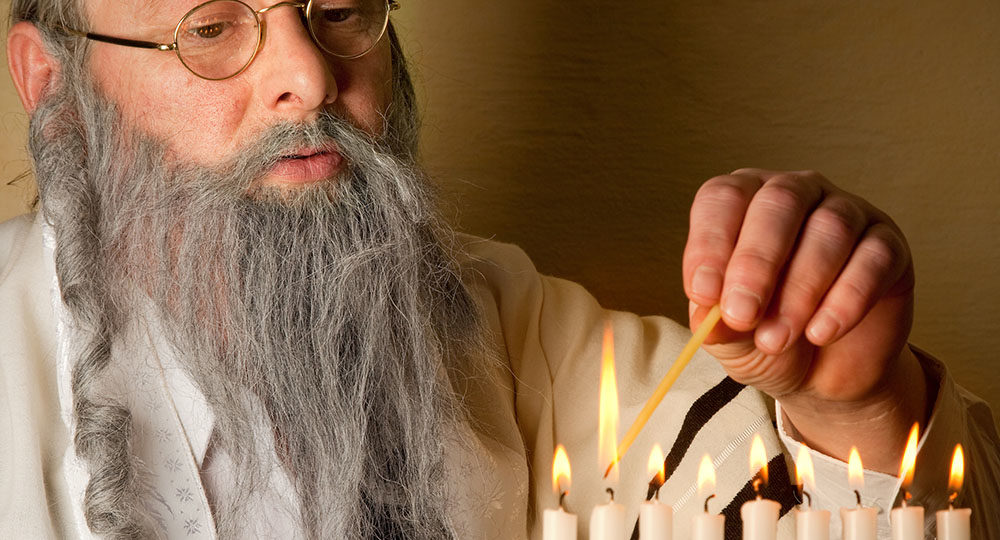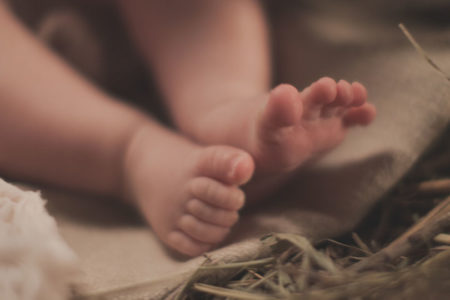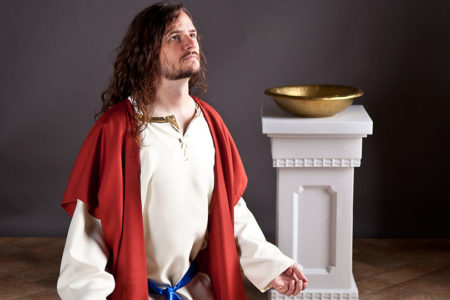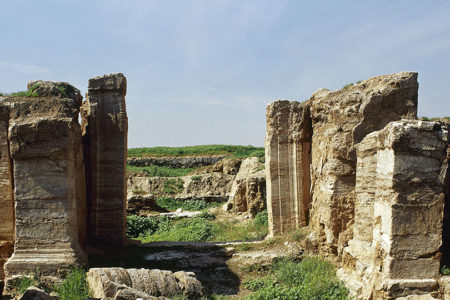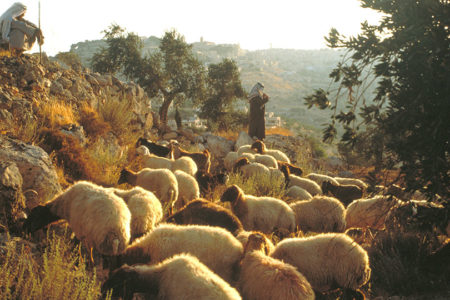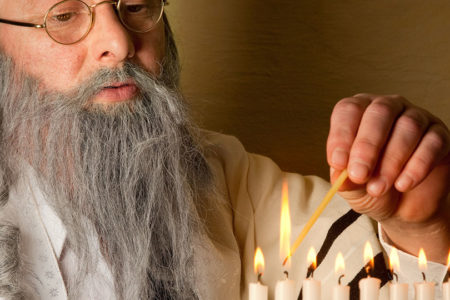A Hanukkah Menorah
Many years ago Dr. Blair P. Grubb, an American famous for his work on disorders of the autonomic nervous system, collaborated with physicians in France to help a little French girl whose disease baffled her doctors, including her grandfather, also a physician. After Dr. Grubb’s treatment, the girl made a seemingly miraculous recovery, and her grateful grandparents invited Dr. Grubb to visit them if he were ever in France.
Several years later, in 1996, Dr. Grubb went to France to speak at a large, international scientific meeting. He visited the grandparents and was given something so significant it brought him to tears. Here is part of that story, in Dr. Grubb’s own words:
After a time the woman [grandmother] asked, “My husband tells me you are Jewish, no?”
“Yes,” I said, “I am a Jew.”
They asked me to tell them about Judaism, especially the holidays. I did my best to explain and was astounded by how little they knew of Judaism. She seemed to be particularly interested in Hanukkah. Once I had finished answering her questions, she suddenly looked me in the eye and said, “I have something I want to give to you.”
She disappeared and returned several moments later with a package wrapped in cloth. She sat, her tired eyes looking into mine, and she began to speak slowly.
“When I was a little girl of eight years, during the Second World War, the authorities came to our village to round up all the Jews. My best friend at that time was a girl of my age named Jeanette. One morning when I came to play, I saw her family being forced at gunpoint into a truck. I ran home and told my mother what had happened and asked where Jeanette was going. ‘Don’t worry,’ she said, ‘Jeanette will be back soon.’ I ran back to Jeanette’s house only to find that she was gone and that the other villagers were looting her home of valuables, except for the Judaic items, which were thrown into the street.
“As I approached, I saw an item from her house lying in the dirt. I picked it up and recognized it as an object that Jeanette and her family would light around Christmas time. In my little girl’s mind I said, ‘I will take this home and keep it for Jeanette until she comes back,’ but she and her family never returned.
“Since that time I have kept it. I hid it from my parents and didn’t tell a soul of its existence. Indeed, over the last 50 years the only person who knew of it was my husband. When I found out what really happened to the Jews, and how many of the people I knew had collaborated with the Nazis, I could not bear to look at it. Yet I kept it, hidden, waiting for something, although I wasn’t sure what. Now I know what I was waiting for. It was you, a Jew, who helped cure our granddaughter, and it is to you I entrust this.”
Her trembling hands set the package on my lap. I slowly unwrapped the cloth from around it. Inside was a menorah, but one unlike any I had seen before. Made of solid brass, it had eight cups for holding oil and wicks and a ninth cup centered above the others. It had a ring attached to the top, and the woman mentioned that she remembered that Jeanette’s family would hang it in the hallway of their home. It looked quite old to me; later, several people told me that it is probably at least 100 years old. As I held it and thought about what it represented, I began to cry.
All I could manage to say was a garbled “merci.” As I left, her last words to me were “Il faudra voir la lumière encore une fois”—“it should once again see light.”
The menorah is the very heart of the Jewish holiday of Hanukkah. Just as Adolf Hitler tried to exterminate the Jewish people in the 20th century, Antiochus Epiphanes tried it in the second century B.C. To Bible-believing Christians, the lights of the menorah should testify to God’s faithfulness and His promise in the book of Jeremiah that no one will ever be able to destroy His Chosen People (Jer. 31:35–37).
This year Hanukkah begins at sundown on December 8. It is always celebrated for eight days in November or December, beginning four days before the new moon. Each night at sundown, Jewish families gather to light their Hanukkah menorahs. A Hanukkah menorah is special because it has nine candles: one for each day of the holiday and one called the shamash, or servant candle, used to light each of the others.
On the first night of Hanukkah, the shamash lights only one candle. On the second night, two; so on and so forth until all are lit. The candles are lit from right to left, corresponding with Hebrew, which is read from right to left.
The Hanukkah blessing is either sung or recited while the candles are being lit. I can still hear my mother’s voice singing it as she lit the little brass and blue menorah we had when I was growing up in New York. Each year I learned more of the prayer, in hopes of singing it to my own children one day.
Barukh atah Adonai, Eloheinu, melekh ha’olam, asher kidishanu b’mitz’votav v’tzivanu l’had’lik neir shel Hanukkah. Amein.
Blessed are you, Lord, our God, King of the universe, who has sanctified us with His commandments and commanded us to light the lights of Hanukkah. Amen.
The menorah reminds the Jewish people of the miracle of the oil following the defeat of the evil Antiochus IV. Antiochus liked to call himself Epiphanes, meaning “the illustrious.” The Jews, however, called him Antiochus Epimanes, “the Madman.”
He was so evil he not only murdered thousands of Jewish people but also desecrated the Temple in Jerusalem by filling it with statues of Greek gods and sacrificing a female pig on the altar. In 164 B.C. the Maccabees liberated Judea from Antiochus’s oppression and rededicated the Temple.
Tradition has it that only one cruse of consecrated oil was found—enough to keep the Temple’s eternal light burning for one day. Yet the little cruse miraculously burned for eight days, the time it took to consecrate more oil.
Oil, therefore, plays an important role in Hanukkah. Traditional foods of Hanukkah are cooked in oil, such as potato latkes (pancakes), jelly donuts, sesame candy, fried matzo, and kasha (buckwheat) with bow ties (pasta).
Hanukkah is a joyous time of remembering the purified Temple as it was restored to the worship of Jehovah, the true and living God.
In Hebrew, Hanukkah means “feast of dedication.” In the apocryphal book of 1 Maccabees 4:59, it is called “the days of the dedication of the altar.” In his Antiquities of the Jews, ancient historian Josephus called it “the feast of lights.”
Gift-giving is not a tradition originally associated with Hanukkah, but with its close proximity to Christmas, the giving of one gift on each night has become a favorite with children.
In Israel, however, presents are deemphasized. According to VirtualJerusalem.com, “The fifth night of Chanukah has been called ‘The Black Fifth Night,’ after that fateful night during World War I when the Turks expelled all Jewish residents from Tel Aviv and Jaffa.”1
Jeanette would have understood such an event. No one knows what happened to her after the Nazis deported her and her family. Approximately 300,000 Jewish people lived in France when Germany invaded in 1940. Of those, 76,000 were deported between 1942 and 1944.2 Most went to the infamous concentration camp of Auschwitz, where they were exterminated.3
Dr. Grubb wrote that he later learned the French woman who gave him Jeanette’s menorah that day in 1996 died less than a month later. He kept his promise to her: “This Hanukkah, the menorah will once again see light. And as I and my family light it,” he wrote, “we will say a special prayer in honor of those whose memories it represents. We will not let its lights go out again.”
ENDNOTES
- “Chanukah Customs Around the World” <virtualjerusalem.com/holidays1.php?Itemid=1667>.
- “Transports From France,” Aktion Reinhard Camps <deathcamps.org/reinhard/deportfrance.html>.
- Ibid.
